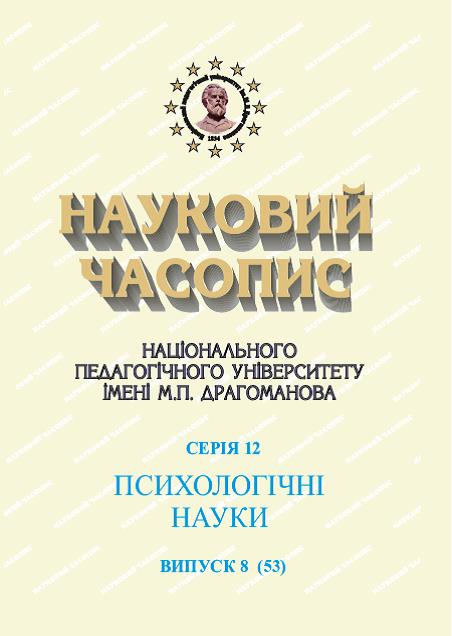DIGNITY AS A PSYCHOLOGICAL COMPONENT OF THE SOCIAL PARTNERSHIP MODEL
DOI:
https://doi.org/10.31392/NPU-nc.series12.2019.8(53).08Keywords:
social partnership, models of social partnership, dignity, education of citizens, students of psychological specialtiesAbstract
Social partnership, as a collaboration between participants in the educational process, public organizations, private and public institutions, is a means of involving young people in the processes of implementation of broad spectrum projects. The importance of social partnership is also reflected in the statute of the International Labor Organization (ILO), which emphasizes the impact of cooperation between all parts of the work process on the human dignity. Social dialogue as a mechanism for the realization of partnership is a factor influencing the formation and development of the individual as a member of society. Thus, social partnership, based on the unconditional recognition of human dignity as the basic moral value of humanity, above all contributes to the strengthening of self-esteem at the personal level of the citizen. The latter, in turn, affects the social behavior of the individual, which acquires both moral and civic color. At the current stage of the development of Ukrainian statehood, the need to educate a new generation of independent, critically minded, democratic youth with a developed sense of dignity becomes an urgent need. It is precisely the preference for the values of freedom, independence and free, responsible self-realization that is embedded in the concept of a new Ukrainian school, which also serves as one of the links of social partnership in the education of a growing generation of conscious citizens. Thus, it is determined that a necessary psychological component of building a functioning model of social partnership is the sense of dignity of the individual. The article presents the analysis of foreign and domestic experience of building interaction models of institutions of different types for education of competent, independent, creative, democratic citizens, analyzes the psychological component of social partnership, namely the dignity of the individual. The author conducted a practical study aimed to find out the meaningful content that fits into the concept of «dignity» of students of psychological specialties of higher education.
References
- Bekh, I.D. (2009). Pochuttia hidnosti u dukhovnomu rozvytku osobystosti. Psykholohichni dzherela vykhovnoi maisternosti [Feeling of dignity in the spiritual development of the individual. Psychological sources of educational masters]. Kyiv : Akademvydav [in Ukrainian].
- Doichyk, M.V. (2018). Ideia hidnosti v istorii yevropeiskoi filosofii [The idea of dignity in the history of European philosophy]. Ivano-Frankivsk : Prykarpat. nats. un-t im. V.Stefanyka [in Ukrainian].
- Allan, A., & Davidson, G.R. (2013). Respect for the Dignity of People. Australian Psychologist, 48(5), 345-352. https://doi.org/10.1111/ap.12012
- Bess, M. (2018). Eight Kinds of Critters: A Moral Taxonomy for the Twenty-Second Century. The Journal of Medicine and Philosophy: A Forum for Bioethics and Philosophy of Medicine, 43(5), 585–612. https://doi.org/10.1093/jmp/jhy018
- Gobl, Ch., & Chasaide, A.N. (2000) Testing affective correlates of voice quality through analysis and resynthesis. Proceedings from SaE’ 00: ITRW on Speech and Emotion (Newcastle, Northern Ireland, UK, September 5-7, 2000) (рр.178-183). Retrieved from https://www.isca-speech.org/archive_open/archive_papers/speech_emotion/spem_178.pdf
- Islahuddin, Tolla, I. & Mansyur (2016). A Holistic Model of Partnership in Education. International Journal of Environmental and Science Education, 11(13), 5915-5924. http://www.ijese.net/makale_indir/752
- Danim, S. (2010). Introduction to Education, the Theoretical Basis, and Educational Metaphor. Bandung: Alfabeta
- Hauskeller, M. (2011). Believing in the Dignity of Human Embryos. Human Reproduction & Genetic Ethics, 17(1), 53-65. https://doi.org/10.1558/hrge.v17i1.53
- Herrman, Ch. (2019). What Is Dignity? Eidos. A Journal for Philosophy of Culture, 3(3), 103-126. https://doi.org/10.14394/eidos.jpc.2019.0033
- Lee, P., & George, R. (2008). The Nature and Basis of Human Dignity. Ratio Juris, 21, 173-93. https://doi.org/10.1111/j.1467-9337.2008.00386.x
- McClelland, R.Т. (2011). A Naturalistic View of Human Dignity. The Journal of Mind and Behavior, 32(1), 5-48. Retrieved from www.jstor.org/stable/43854287

